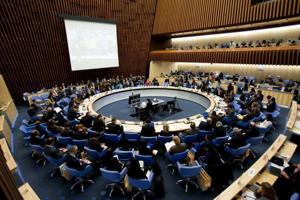Matthew RobinsonGHTC
Matthew Robinson is a policy and advocacy officer at GHTC who leads the coalition's multilateral advocacy work.
With the New Year underway, GHTC is looking forward to a busy spring of multilateral organization meetings—with a number of them impacting global health research and development (R&D). First on the agenda is the World Health Organization (WHO) Executive Board (EB) meeting on January 25–30 in Geneva, where the EB will receive updates on a number of topics and make important decisions, particularly around how to proceed with the next steps of the Consultative Expert Working Group on Research and Development: Financing and Coordination (CEWG) process.
The full provisional agenda is available here, but below, GHTC’s Matt Robinson highlights what you can expect on global health R&D related topics.

Agenda item #7 – Promoting health through the life course – Tuesday, January 26
7.1 – Monitoring of the achievement of the health-related Millennium Development Goals (MDGs) – Update to the Board
The development of indicators to monitor progress toward the health-related MDGs has been a key priority for the WHO. This update to the Board outlines the current slate of health indicators, including indicator 8.E on affordable access to medicines.
7.2 – Health in the 2030 agenda for sustainable development – Update to the Board
In this session the WHO Secretariat will present a report tracing the development of the Sustainable Development Goals (SDGs), outlining key differences from the MDGs, and highlighting potential changes required at WHO to ensure a leading role for health in the new SDG framework. As the lead United Nations agency on health, how effectively WHO can continue to advocate for the role of health in achieving the broader SDGs will shape the global health landscape.
GHTC has been tracking progress on the SDG monitoring framework and proposed specific indicators to measure global health R&D in our report, “ Measuring Global Health R&D for the Post-2015 Development Agenda.” GHTC also produced a factsheet and a webinar on innovation in the SDGs.
Agenda item #8 – Preparedness, surveillance and response – Wednesday, January 27
8.5 – Global action plan on antimicrobial resistance – Update to the Board
Following on two previous World Health Assembly (WHA) resolutions on antimicrobial resistance, the Secretariat will propose either a summit at the opening of the 2016 General Assembly or a high-level side event on the margins of the same. Given the dramatic rise in antimicrobial resistance globally, WHO hopes to use this high-level event to mobilize global support and resources both to develop new antibiotics and to ensure that current drugs are used appropriately.
Agenda item #9 – Communicable diseases – Tuesday, January 26
9.1 – 2014 Ebola virus disease outbreak and issues raised: follow-up to the Special Session of the Executive Board on the Ebola Emergency (resolution EBSS3.R1) and the Sixty-eighth World Health Assembly (decision WHA68(10))
Unfortunately the text of this report is not yet available, stay tuned for our post-EB blog and more information!
Agenda item #10 – Health systems – Thursday, January 28
10.2 – Comprehensive evaluation of the global strategy and plan of action on public health, innovation and intellectual property: progress update – Update to the Board
The 2015 WHA directed the WHO Director-General to undertake an evaluation of the global strategy and plan of action on health, innovation, and intellectual property. The Secretariat will present a report outlining the work conducted so far, as well as an addendum containing key points from the evaluation inception report, including the principles that will be used in developing the full evaluation plan and design.
10.3 – Follow-up to the report of the Consultative Expert Working Group on Research and Development: Financing and Coordination – Planning for an open-ended meeting of Member States to discuss progress – Board Decision
This report and decision point are two key items on the EB agenda. The CEWG on Research and Development: Financing and Coordination process continues moving forward and faces some key decisions in the coming months. At the meeting, the EB will decide if civil society will be able to participate consultative open-ended meetings scheduled for March, which will determine what resolution is put forward to the WHA. GHTC is a strong advocate for civil society’s inclusion in the process.
10.4 – Substandard/spurious/falsely-labelled/falsified/counterfeit medical products – Update to the Board
The Director-General of the WHO was directed to convene a series of expert consultations on possible methods to counteract substandard as well as falsified medical products by a 2012 WHA resolution. To that end, a number of expert committees have met and produced the priority recommendation of creating a global network of focal points to tackle issues in the quality of the drug supply. These focal points would then be responsible for linking existing quality-assurance networks to a global one to ensure collaboration. Although there is no decision point in the document, work on this issue clearly continues apace.
While GHTC will follow these agenda items closely, we will also keep an eye out for other late-breaking resolutions or developments and will post a follow-up blog after the EB with updates on the actual happenings!
Matt Robinson in GHTC's Policy & Advocacy Officer.